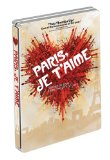| Reviews & Columns |
|
Reviews DVD TV on DVD Blu-ray 4K UHD International DVDs In Theaters Reviews by Studio Video Games Features Collector Series DVDs Easter Egg Database Interviews DVD Talk Radio Feature Articles Columns Anime Talk DVD Savant Horror DVDs The M.O.D. Squad Art House HD Talk Silent DVD
|
DVD Talk Forum |
|
|
| Resources |
|
DVD Price Search Customer Service #'s RCE Info Links |
|
Columns
|
|
|
Paris Je T'aime: Two-Disc Steelbook
First Look Pictures // R // November 18, 2008
List Price: $19.98 [Buy now and save at Amazon]
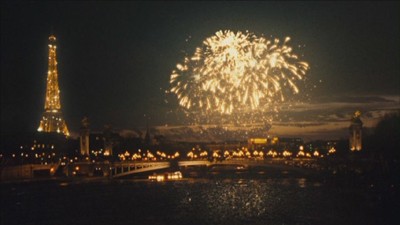
The Film:
Think of a portrait of the Eiffel Tower, the grid of numerous Parisian districts, and the stretches upon stretches of ambient-lit streets in the City of Love -- all painted atop a colorful marble slab in a beautifully arranged image. Now, picture the tablet after being shattered, rendering each little nugget as a uniquely colorful element of Paris. Then, imagine all these little pieces glued back together into the exact same image, only arranged in a diverse manner with different patterns, color choices, and insights into each corner and shape of the city. That's Paris Je T'aime, a truly unique mosaic film assembled and directed by eighteen splendid one-or-two man director teams.
Unlike other vignette-driven works that share like themes or interlaced characters, this collection of short films -- each one a stanza within a grand love poem composed for the City of Love -- have very little in common outside of the architecture in their backdrops. That's what makes the experience unique, though; Paris Je T'aime doesn't even try to unify style, even when it interconnects each little segment with a scenic shot of the focal district's architecture, congested and beautiful as it may be. Instead, it allows for individual imprints, ones that can be striking familiar to anyone with experience with the directors. Watching Gus Van Sant's communication-based rendezvous short felt like watching a Van Sant picture, void of any kinds of filters or controls to keep it uniform with the rest of the film's canvas. No matter which director we're talking about, they all still find a common thread even amid their efforts at individualism: an understanding of the Parisian essence, and a grasp on the multifaceted natures of love -- all coming together in something close to a photojournalist essay on the city's kinetic emotionality.
Like individual taste itself, portions of Paris Je T'aime will resonate more with some than with others. Some might find the surrealist stylings of Sylvian Chomet and Christopher Doyle might embody their whimsical interpretations of Paris, while others might gravitate to the gritty, gripping pedestrian efforts from Alfonso Cuaron and Olivier Assayas that focus more on the human condition than on environmental sponginess. The safe word is that they're all cleverly assembled and beautifully drawn, highlighting unique, composite entities within each one that feels like a crash course through the Paris population -- one with as lush and differentiated a culture as the visitor / citizens deems fit to discover. Below are a series of personal favorites from Paris Je T'aime -- just a few examples of the graceful blend of styles present in this pleasantly non-cohesive scrapbook of imagery and sentiment.
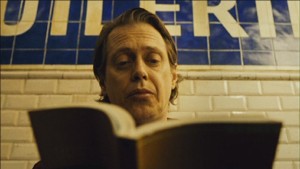
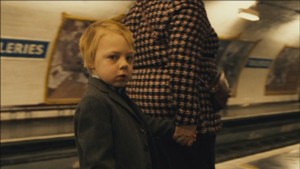
Tuileries -- Directed by Joel and Ethan Coen
Though individual style pours through in most of these works, the Coen Brothers' signature style really screams out in this classic short. Fargo and Big Lebowski veteran Steve Buscemi takes center stage as an out-of-place tourist fidgeting in his seat on a bench in the Parisian rail station. He thumbs through an English language tourist guide to the city as a time killer during his wait for the train. Suddenly, his eyes fall upon the mention of "not making eye contact" in the station -- a real-life warning for visitors, but one mainly geared for women. Here, as Buscemi mistakenly matches eyesight with a spitwad-wailing boy and a testosterone-infused guy courting his sumptuous girlfriend, the worst is bound to happen.
What makes the Coen's segment so prolific comes in its ability to say everything in the world while physically saying nothing at all. Buscemi, though his facial expressions express more than countless pages of dialogue, doesn't utter a single word during his brewing argument with the locals -- which becomes a clever-as-hell technique. It's just naturally assumed that Buscemi's character is an American, or at least an English-speaking individual; however, through his lack of spoken words, he could embody any country of any creed. He could be literally anybody: conservative bible-thumper, perverted voyeur, or just an average ... German, Italian, whomever, who possesses the ability to read the English language; yet, he ultimately becomes what we perceive him to be. In this dynamic of anonymity, Buscemi's natural charisma takes center stage as he plays top banana to slapstick humor and situational awkwardness. It's classic Coen humor with dashes of Mel Brooks in for good measure, taking the style of the piece straight to the top of both this film's potential and to the directors' repertoire.
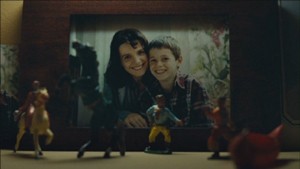
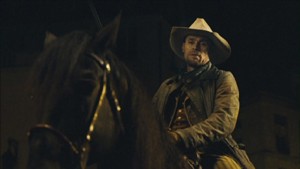
Place de Victoires -- Directed by Nobuhiro Suwa
When you're thinking about a collection of French-inspired short stories, the last genre that you'd probably expect to make a cameo would be ghost-story drama, right? That's part of the charm with Paris Je T'aime -- it breaks free of some of those kinds of boundaries. Nobuhiro Sawa's piece reflects a persona of popularized Japanese ghost story cinema, all centered on a powerhouse performance from Juliette Binoche. Mass-emotional mannerisms surround her portrayal of a bereaved mother who has recently lost her child, which all echo with exquisite strength.
She believes to have heard his voice in the streets of the Place de Victoires, which lures her into the presence of a horse-backed cowboy played by Willem Dafoe. He's clearly an apparition, but that's more than enough for any mother when he promises to give her a glimpse of her son. Though it's equally as short as the rest of the vignettes within the film, there's mass potency at work in this emotionally-focused dissection of raw emotionality. As mentioned before, Binoche is excellent in her role -- but hats off to Willem Dafoe, as well. His haunting, effervescent presence as a semi gatekeeper to the underworld will leave you thoughtful for a spell. There's a haunting atmosphere about the entire thing, one intensified by a mother's undying love and a uniquely bridged gap between reality and limbo. Nobuhiro Sawa's not-so-creepy ghost story only becomes a haunting affair due to the emotions brewing within Binoche's fantastic performances.
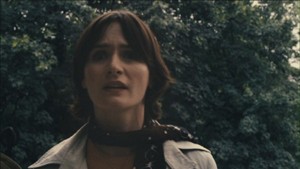
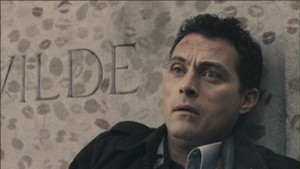
Père Lachaise -- Directed by Wes Craven
Though Paris Je T'aime is an exercise in familiar design, Wes Craven's portion exists as one of the greater departures from normalcy that the film exhibits of its directors. Sure, he's delved into more sentimental works of cinema beforehand with Music of the Heart, but Scream or Red Eye this isn't. It features a couple, played by persistently underappreciated actors Emily Mortimer and Rufus Sewell, as they scour a French graveyard for the site of Oscar Wilde's odd-looking burial site. Showered in kisses for respect for one of the great writers and thinkers about human nature, Rufus Sewell's character must try and discover his fiance's intricate affection for him if they're going to continue their relationship.
It's great that Craven's portion directly follows the vampire vignette -- the sole exercise in horror from the collection -- with something on the sappier side for Paris Je T'aime. But what a delicious little dry treat it is; Mortimer and Sewell are both fantastic here, displaying a chemistry I'd love to see in a full-length romantic film, though it encapsulates so well in this tell-tale narrative illustrating the epitomical French love experience. It's a simple story of a man with reserved passion and a woman with passionate reserve, all intertwined within a dance that sketches out how their future will turn out. Craven lends a bouncy feel to their rapport, playing off the natural charisma from both actors as they intermingle in a traditional, modern argument about feelings, business activity, and emotional communication. But there's something weighty about their communication -- as well as Sewell's communication with Wilde himself -- that speaks to romance itself, though its rhythm seems fairly commonplace. It's the most popcorn version of the lot, but the way Craven photographs it, the chemistry between Sewell and Mortimer, and the conveyance of the death-latched location speak more than the mere text of the segment itself.
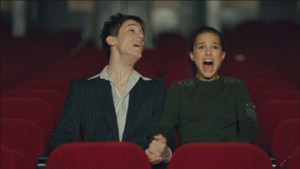
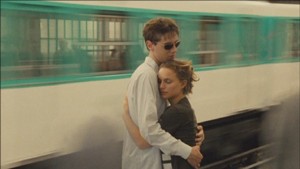
Faubourg Saint-Denis -- Directed by Tom Tykwer
Most cinema lover's first experience with Tom Tykwer comes in the film school regulation masterwork, Run Lola Run. It's an exercise in the fervency of kinetic energy, as well as an exercise in dissecting time differentials and the malleability of the fabric of existence as we know it. Strangely enough, I see plenty of Tykwer's more famous work in his Famourg Saint-Denis piece; being reminded of the snapshot-memory scenes in Lola's story will feel very familiar in this love story between Natalie Portman's passionate actress and Melchior Beslon's blind guy's astuteness. Furthermore, this piece's momentum is equally as quick, boisterous, and rhythmic as his renowned film -- only carrying less immediacy and more intimacy.
Though narrative is near non-existent here, Tykwer's segment speaks more to the heart than to the brain. It starts out with a guy listening to his girlfriend on the phone, followed by the barrage of visuals that led him to that point -- all edited in ramped-up speed for quick digestion. It's obvious that Tykwer can assemble beautiful works of art that stretch beyond Run Lola Run's means, via Perfume: The Story of a Murderer, so it's clearly intentional; the quick rhythm, the rapid changes in environment and mood, and the overall blitzed transformations in aesthetic and emotional flow seem tailor-made to be an alteration to its rhythm, which seems more like an ode to its poetic romanticism via different characters and different environment than anything. With a combination of Portman's signature charm and Belson's quirky yet earnest demeanor, this ever-so-familiar segment from Tykwer stands out as a breath of familiar romantic air.
The DVD:
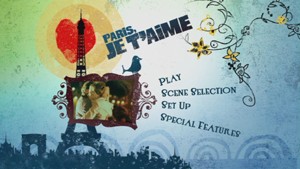
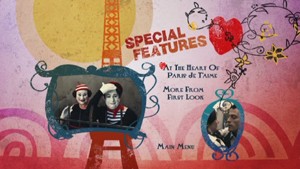
Paris Je T'aime comes from First Look Features as a portion of their rehashed steelbooks to coincide with their Blu-ray releases. In other words, this is the exact same discs as the Limited Two-Disc Special Edition that has flickered in and out of print over the months. It's a nicely-designed package, though, with stacked discs over a two-disc tray on the right-hand side.
The Video:
Visually, Paris Je T'aime is an incredible diverse picture -- but not in aspect ratio, which stays locked right around 1.78 -- 1.85:1 in its anamorphic image. Direction of photography changes with each film, shifting from stark emphasis on pedestrian movement to visually intriging slices of cinema. In that, the film can be a bit difficult to judge visually outside of the exact merits of the transfer. Some elements, like Van Sant's concentration on human detail, looks both natural and pale in the same breadth; on the other hand, the overblown exposition within a few of the more visual films get a little murky in the process. Ghosting and edge enhancement crop up intermittently, but they don't deter the image too far in the wrong direction.
The Audio:
In a surprising turn, Paris Je T'aime offers up a DTS 5.1 track that concentrates more on clarity than robustness or dimensionality. Though it carries a higher-bitrate track, the audio treatment still stays firmly planted at the front of the soundstage. It's exceedingly front heavy, but it sports an apt concentration on sprawling clarity for the different ranges that the track requires. However, it still disappoints in spots by way of muffled dialogue and such -- which, more than likely, stems from the wider range of source tracks than just the audio treatment. It's hit and miss with impressiveness, but it serves the film well enough. Dolby Digital 5.1 and 2.0 options are also available, but the English subtitles don't seem to be removable. There's an option for English SDH and Spanish, but when the subtitles are turned "Off" the English subs still float on-screen.
The Extras:
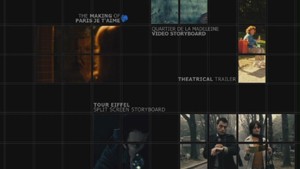
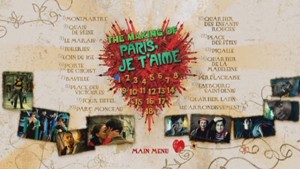
At the Heart of Paris Je T'aime:
As the sole special feature on the first disc -- which happens to be the single-disc version available -- this featurette tries to cram bits and pieces about each one of the segments within twenty-five (25) minutes. There's interview time with most of the directors, some spots of actor blurbs, as well as some classy, quick behind-the-scenes shots. If bloated making-of featurettes aren't your cup of tea, then this piece will suit you well.
On "Bonus" Disc 2:
The Making of Paris Je T'aime:
As the big hook to picking up this two-disc set, this series of making-of featurettes focus on each and every one of the short films from Montmatre to 14e Arrondissement. Most of them last between seven (7) to nine (9) minutes or so and features the same spectrum of tidbits as any other featurette -- techniques, photography, actor impressions, director insights, what have you. There's not an option to view them all at once, which is understandable considering that 8+ minutes for each short would level the runtime right at around two-and-a-half hours of material. They are not, however, enhanced for widescreen televisions.
Also available are two Storyboard to Screen pieces for Quartier de la Madeleine and Tour Eiffel, as well as an anamorphic Trailer.
-----
Final Thoughts:
There's a lot of vivacity and passion behind Paris Je T'aime, which crafts it into one of the better vignette pictures out there. As typical with similar film experiences, some of the segments offer more substantial doses of cinematic bravado than others, but each one shares a diverse and consistent appreciation for Paris' radiance. First Look Pictures have rehashed the limited two-disc released in an attractive steelbook packaging -- without anything else to really sell the package. If you haven't picked up the DVD, then this $20 set provides a strongly Recommended presentation for a strong exposition in directorial diversity and emotionality that sprawls out across just about every genre line.
|
| Popular Reviews |
| Sponsored Links |
|
|
| Sponsored Links |
|
|
| Release List | Reviews | Shop | Newsletter | Forum | DVD Giveaways | Blu-Ray | Advertise |
|
Copyright 2024 DVDTalk.com All Rights Reserved. Legal Info, Privacy Policy, Terms of Use,
Manage Preferences,
Your Privacy Choices | |||||||









